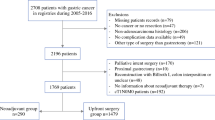Abstract
Background
The 1-year disease-related mortality after resection for pancreatic cancer is approximately 30%. This study examined potential preoperative parameters that would help avoid unnecessary surgery.
Methods
Among the patients resected at our institution from 1997 to 2006, a total of 228 underwent pancreatic resection for ductal adenocarcinoma. By means of a survival cutoff of 12 months, two groups were created: early death (ED) and long survivors. A logistic regression analysis was performed to identify perioperative predictors of ED.
Results
Among 228 resected patients, postoperative mortality occurred in four cases (1.8%) that were excluded from the study. In the remaining 224 patients, 43 (19.2%) died of disease within 12 months from surgery (ED), and the remaining 181 (80.8%) had a longer survival. Multivariate analysis selected duration of preoperative symptoms >40 days, CA 19-9 > 200 U/mL, pathological grading G3–G4, and R2 resection as independent predictors of ED.
Conclusions
Duration of symptoms, CA 19-9 serum level, and pathological grading possibly retrieved by endoscopic ultrasound–guided biopsy can be preoperatively used to identify patients with disease that is not suitable for up-front surgery, even if deemed resectable by high-quality imaging.




Similar content being viewed by others
References
Zuckerman DS, Ryan DP. Adjuvant therapy for pancreatic cancer: a review. Cancer. 2007;112:243–9.
Picozzi VJ, Pisters PW, Vickers SM, Strasberg SM. Strength of the evidence: adjuvant therapy for resected pancreatic cancer (review). J Gastrointest Surg. 2008;12:657–61.
Takamori H, Hiraoka T, Kanemitsu K, et al. Identification of prognostic factors associated with early mortality after surgical resection for pancreatic cancer—under-analysis of cumulative survival curve. World J Surg. 2006;30:213–8.
Kennedy EP, Yeo CJ. The case for routine use of adjuvant therapy in pancreatic cancer (review). J Surg Oncol. 2007;95:597–603.
Burris HA III. Recent updates on the role of chemotherapy in pancreatic cancer (review). Semin Oncol. 2005;32(4 Suppl 6):S1–3.
Springett GM, Hoffe SE. Borderline resectable pancreatic cancer: on the edge of survival (review). Cancer Control. 2008;15:295–307.
American Joint Committee on Cancer. AJCC cancer staging manual, 6th edn. New York: Springer, 2002;157–64.
Neoptolemos JP, Stocken DD, Friess H, et al. A randomized trial of chemoradiotherapy and chemotherapy after resection of pancreatic cancer. N Engl J Med. 2004;350:1200–10.
Traverso LW. Pancreatic cancer: surgery alone is not sufficient. Surg Endosc. 2006;20(Suppl 2):S446–9.
Vento P, Mustonen H, Joensuu T, et al. Impact of preoperative chemoradiotherapy on survival in patients with resectable pancreatic cancer. World J Gastroenterol. 2007;13:2945–51.
Varadhachary GR, Tamm EP, Abbruzzese JL, et al. Borderline resectable pancreatic cancer: definitions, management, and role of preoperative therapy (review). Ann Surg Oncol. 2006;13:1035–46.
Brunner TB, Grabenbauer GG, Meyer T, et al. Primary resection versus neoadjuvant chemoradiation followed by resection for locally resectable or potentially resectable pancreatic carcinoma without distant metastasis. A multi-centre prospectively randomised phase II-study of the Interdisciplinary Working Group Gastrointestinal Tumours (AIO, ARO, and CAO). BMC Cancer. 2007;7:41.
Welsch T, Büchler MW, Schmidt J. [Surgery for pancreatic cancer]. Z Gastroenterol. 2008;46:1393–403.
Le Page S, Caputo S, Kwiatkowski F, Berard P, Gouillat C. [Functional outcome and quality of life after pancreaticoduodenectomy]. J Chir. 2008;145:32–6.
Sperti C, Pasquali C, Catalini S, et al. CA 19-9 as a prognostic index after resection for pancreatic cancer. J Surg Oncol. 1993;52:137–41.
Schniewind B, Bestmann B, Henne-Bruns D, et al. Quality of life after pancreaticoduodenectomy for ductal adenocarcinoma of the pancreatic head. Br J Surg. 2006;93:1099–107.
Safi F, Schlosser W, Falkenreck S, Beger HG. Prognostic value of CA 19-9 serum course in pancreatic cancer. Hepatogastroenterology. 1998;45:253–9.
Ferrone CR, Finkelstein DM, Thayer SP, et al. Perioperative CA19-9 levels can predict stage and survival in patients with resectable pancreatic adenocarcinoma. J Clin Oncol. 2006;24:2897–902.
Barugola G, Falconi M, Bettini R, et al. The determinant factors of recurrence following resection for ductal pancreatic cancer. JOP. 2007;8(1 Suppl):132–40.
Takamori H, Hiraoka T, Kanemitsu K, Tsuji T. Pancreatic liver metastases after curative resection combined with intraoperative radiation for pancreatic cancer. Hepatogastroenterology. 2004;51:1500–3.
Farrow B, Sugiyama Y, Chen A, et al. Inflammatory mechanisms contributing to pancreatic cancer development. Ann Surg. 2004;239:763–9.
Wang W, Abbruzzese JL, Evans DB, Chiao PJ. Overexpression of urokinase-type plasminogen activator in pancreatic adenocarcinoma is regulated by constitutively activated RelA. Oncogene. 1999;18:4554–63.
Shibata K, Matsumoto T, Yada K, Sasaki A, Kitano S. Factors predicting recurrence after resection of pancreatic ductal carcinoma. Pancreas. 2005;31:69–73.
Micames C, Jowell PS, White R, et al. Lower frequency of peritoneal carcinomatosis in patients with pancreatic cancer diagnosed by EUS-guided FNA vs percutaneous FNA. Gastrointest Endosc. 2003;58:690–5.
Larghi A, Verna EC, Stavropoulos SN, et al. EUS-guided Trucut needle biopsies in patients with solid pancreatic masses: a prospective study. Gastrointest Endosc. 2004;59:185–90.
Varadarajulu S, Fraig M, Schmulewitz N, et al. Comparison of EUS-guided 19-gauge Trucut needle biopsy with EUS-guided fine-needle aspiration. Endoscopy. 2004;36:397–401.
Wittmann J, Kocjan G, Sgouros SN, et al. Endoscopic ultrasound-guided tissue sampling by combined fine needle aspiration and Trucut needle biopsy: a prospective study. Cytopathology. 2006;17:27–33.
Eloubeidi MA, Tamhane A, Varadarajulu S, Wilcox CM. Frequency of major complications after EUS-guided FNA of solid pancreatic masses: a prospective evaluation. Gastrointest Endosc. 2006;63:622–9.
Iglesias-Garcia J, Dominguez-Munoz E, Lozano-Leon A, et al. Impact of endoscopic ultrasound-guided fine needle biopsy for diagnosis of pancreatic masses. World J Gastroenterol. 2007;13:289–93.
Moore MJ. Brief communication: a new combination in the treatment of advanced pancreatic cancer. Semin Oncol. 2005;32(6 Suppl 8):5–6.
Author information
Authors and Affiliations
Corresponding author
Rights and permissions
About this article
Cite this article
Barugola, G., Partelli, S., Marcucci, S. et al. Resectable Pancreatic Cancer: Who Really Benefits From Resection?. Ann Surg Oncol 16, 3316–3322 (2009). https://doi.org/10.1245/s10434-009-0670-7
Received:
Revised:
Accepted:
Published:
Issue Date:
DOI: https://doi.org/10.1245/s10434-009-0670-7




